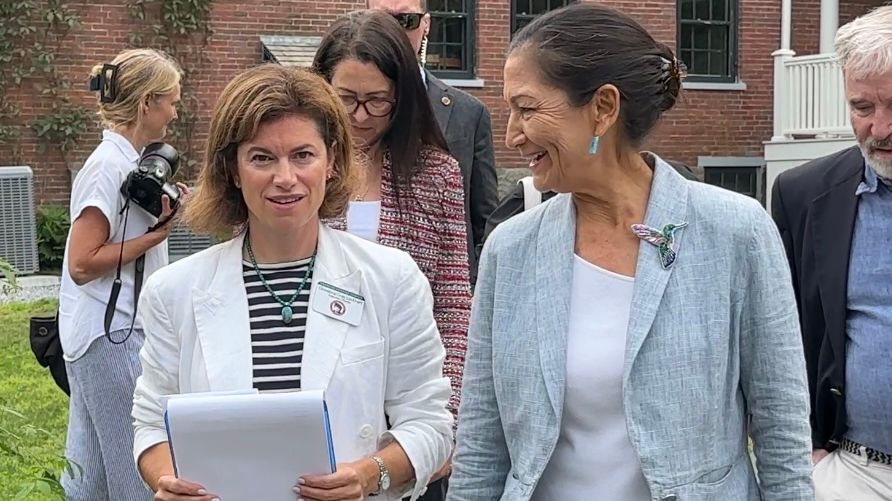U.S. Interior Secretary Deb Haaland toured the Frances Perkins homestead in Newcastle Thursday as part of the federal government’s research into whether the site should be named a national monument.
Perkins, labor secretary under President Franklin Roosevelt, played a key role in many of the protections Americans enjoy today, such as Social Security, the minimum wage, child labor laws and overtime provisions.
Haaland said not enough Americans know about Perkins, the first woman to serve in a presidential cabinet and the longest serving labor secretary.
“Thank you all so much for the work you are doing to make sure that not only Mainers, but all Americans can know about Frances Perkins and her incredible legacy of respect, fairness and equity for workers in America and a work ethic that ensured that she was putting America first,” she said to dozens gathered in the barn on the property.
The visit follows an announcement last week that the Frances Perkins Center is asking the Biden administration to make the property a national monument. Earlier this year, Biden signed an executive order directing his staff to look for more historical sites to honor the contributions of women.
U.S. Rep. Chellie Pingree (D-1st District) joined Haaland, who heard from 18 state and local leaders about Perkins’ impact on the lives of working people. Senate President Troy Jackson (D-Allagash), House Speaker Rachel Talbot Ross (D-Portland), Penobscot Nation Ambassador Maulian Bryant and historian Heather Cox Richardson all shared their thoughts on the importance of honoring Perkins’ legacy.
Pingree said only about eight percent of the 93,000 site listed on the National Register of Historic Places highlight the accomplishments of women.
She said putting the Perkins homestead on the list of national monuments would give tourists another destination in Maine and a chance to learn about an important figure in history.
“We know how much people love to visit Maine in the summer, we see the traffic on the roads,” Pingree said. “And they love to stop and visit, whether it’s Acadia National Park or Katahdin Woods and Waters and all the lovely places on the way.”
Status as a national monument would mean the federal government would own the home, barn and most of the adjacent 57 acres. A parcel would continue to be owned by the Frances Perkins Center for the construction of an educational facility.
Perkins was born in Boston in 1880 and raised in Massachusetts. She was very close to her grandmother, Cynthia Otis Perkins, for whom the Maine homestead was built in 1837.
While Perkins lived in New York City and Washington D.C., she often spent time in Maine. Her grandson, Tomlin Perkins Coggeshall said he remembers her summer visits fondly, knowing that she would put sodas on ice for him and his friends, take him for rides in her 1940 Ford and swim in the Damariscotta River.
“I still remember that first day of riding a bicycle,” he said. “She was right there helping me stay vertical.”
Talbot Ross said Perkins’ efforts during the Great Depression “enabled our nation not only to survive a period of enormous desperation, but also to continue to provide for our wellbeing today.”
As the event wrapped up, Shannon Estenoz, assistant secretary for fish and wildlife and parks for the U.S. Department of the Interior, said several federal officials made the trip to Maine to gather information about the request to become a national monument.
She said efforts to preserve Perkins’ belongings, such as her typewriter, books and Bible, are meaningful to archivists.
“You all have kept them, the family kept them,” she said. “What a tremendous gift to the nation that you’ve kept that history.”
She gave no timetable for a decision on the request, but supporters say they hope to get an answer before Biden leaves office in January.
“By elevating her story through a national monument, we will shine a brighter light on the so-called only woman in the room,” Giovanna Gray Lockhart, executive director of the Frances Perkins Center, said last week. “Future generations will be inspired by Perkins’ belief that government should aim to give all the people under its jurisdiction the best possible life.”








)
